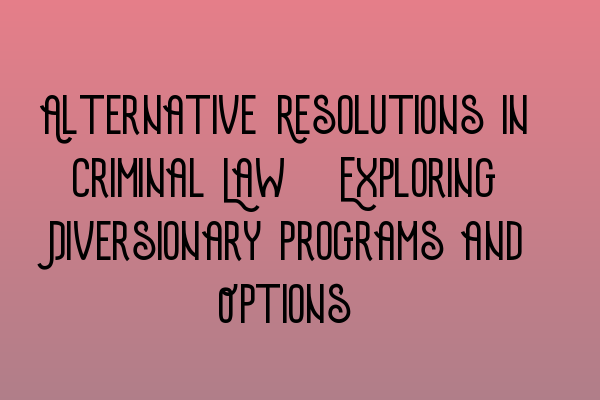Alternative Resolutions in Criminal Law: Exploring Diversionary Programs and Options
When it comes to criminal law cases, the traditional approach has always been to proceed with prosecution and seek punishment for the offender. However, in recent years, there has been growing recognition that not all cases necessarily require this kind of response. Alternative resolutions, such as diversionary programs and options, have emerged as a means to achieve justice in a more nuanced way.
Diversionary programs offer an alternative path for individuals who have committed relatively minor offenses or are first-time offenders. These programs aim to provide opportunities for rehabilitation, education, and support, rather than solely focusing on punishment. By diverting individuals away from the traditional criminal justice system, these programs seek to address the root causes of offending behavior and reduce the likelihood of reoffending in the future.
Types of Diversionary Programs
There are various types of diversionary programs available in the criminal justice system. Some common examples include:
- Pre-charge Diversion Programs: These programs intervene early in the criminal justice process, diverting individuals away from court proceedings and allowing them to participate in rehabilitation or community-based programs.
- Deferred Prosecution Agreements (DPAs): DPAs are formal agreements between the prosecution and the accused, where the prosecution agrees to suspend or defer the charges in exchange for the accused meeting certain conditions, such as community service or restitution.
- Drug Treatment Courts: These specialized courts focus on individuals struggling with substance abuse issues. Participants are provided with support, treatment, and monitoring as an alternative to incarceration.
- Restorative Justice Programs: Restorative justice programs bring together offenders, victims, and the community to address the harm caused by the offense. The focus is on repairing relationships and providing restitution rather than primarily punishing the offender.
The Benefits of Diversionary Programs
Diversionary programs offer several benefits over traditional prosecution and punishment. Firstly, they provide an opportunity for rehabilitation and support, allowing individuals to address the underlying issues that may have contributed to their offending behavior. By focusing on education, counseling, and treatment, these programs seek to break the cycle of crime.
Secondly, diversionary programs can help alleviate the burden on the criminal justice system. By diverting minor offenses away from court, resources can be allocated more efficiently to address more serious crimes. This helps in reducing court congestion and enables a faster resolution of cases, ultimately benefiting both the accused and the criminal justice system as a whole.
Challenges and Considerations
While diversionary programs have many advantages, they are not without challenges. Some critics argue that these programs may offer leniency to offenders, potentially undermining the deterrent effect of the criminal justice system. It is important to strike a balance between rehabilitation and accountability to ensure public safety remains a priority.
Additionally, the success of diversionary programs relies heavily on collaboration and support from various stakeholders, including law enforcement agencies, prosecutors, and community organizations. Adequate funding and resources are crucial to ensure the availability and effectiveness of these programs.
Nevertheless, when properly implemented and tailored to the specific needs of individuals and communities, diversionary programs can be a powerful tool in addressing the complex issues surrounding criminal behavior.
Conclusion
Alternative resolutions in criminal law, such as diversionary programs and options, offer a more comprehensive and rehabilitative approach to justice. By focusing on addressing the underlying causes of offending behavior, these programs aim to reduce reoffending rates and foster positive change in individuals and communities.
To learn more about criminal law and the related topics, explore our related articles:
- SQE 1 Practice Exam Questions
- SQE 1 Practice Mocks FLK1 FLK2
- SQE 2 Preparation Courses
- SQE 1 Preparation Courses
- SRA SQE Exam Dates
